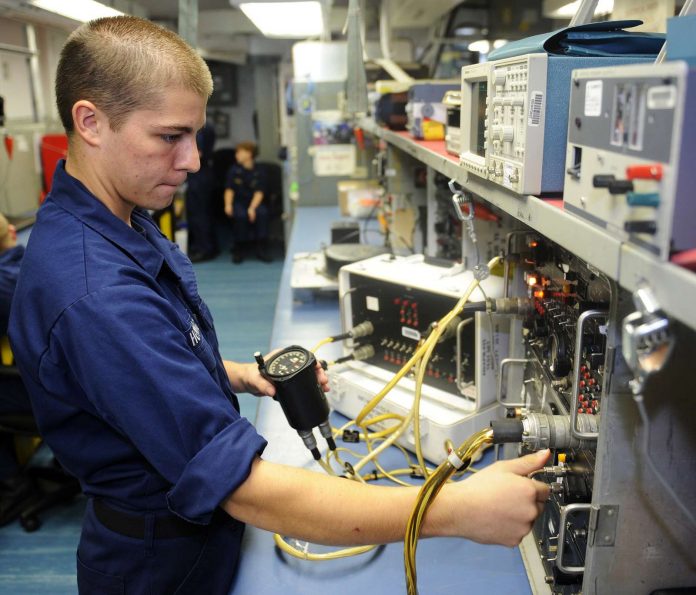Becoming a journeyman electrician is the first step to becoming a master electrician. A journeyman electrician must have either four years of extensive experience working under the supervision of a master’s electrician or a two-year degree or certificate in electrical studies, which serves as the primary licensing requirement.
A journeyman electrician must complete 8,000 hours of supervised practical experience, pass a licensing exam, and learn electrical work’s technical or academic parts. Any newcomer to the field must begin their professional life as an apprentice, learning from a certified electrician. Usually, an apprenticeship lasts for four years and necessitates 2,000 hours of annual on-the-job training.
What does a trainee electrician apprenticeship salary?
An apprentice electrician in the US makes an average of $38,799 per year or $18.65 per hour. On the lower end of the spectrum, the bottom 10% of apprentice electricians make about $28,000 annually, while the top 10% make $52,000.
How much an apprentice electrician can make depends on their location. The states of Hawaii, Alaska, Washington, Vermont, and North Dakota pay the highest wages for apprentice electricians.
How much money can an apprentice electrician make in their first year?
You must obtain a license as a Journeyman Electrician if you want to start a profession as an electrician. It takes either a two-year degree or four years of professional experience to work for a master electrician. As a first-year electrician, you must complete a paid apprenticeship. You will thus be compensated for your on-the-job training.
Read More: A Detailed Guide About Cost Of Living In Philadelphia
What is the electrician apprenticeship salary?
The compensation for electrical apprentices varies depending on where they work and the kind of electrical job they conduct. For instance, the pay for an apprentice outside linesman in Louisiana may be very different than that of an apprentice residential wireman in California. The apprenticeship income is a share of what the licensed craftsman earns, regardless of where you are or what kind of electrician you want. Here are a few illustrations:
· Apprentice inside wiremen
Apprentice inside wiremen install electrical panels, power lines, lighting systems, and other equipment required in business settings. Journeymen in the inside wire industry typically make $43 per hour. Expect new apprentices to make $19 per hour, which is 50% of a journeyman’s pay. Again, the apprentice’s share will increase as they gain knowledge.
· Apprentice for Outside Lineman:
Outside linemen set up, maintained, and fix transmission lines. A journeyman with a license earns a base hourly wage of $50.50. Expect to make about $30 per hour as a new apprentice because their pay is typically 60% of a journeyman’s. As their ability and experience grow, apprentices can anticipate making a higher percentage, eventually earning 90% of the rate of a journeyman.
· Residential Wireman Apprentice
Residential wiremen install, maintain, and repair electrical systems in single-family and multi-family homes residential apprentice wireman. Residential journeymen make an hourly wage of $32, on average. Expect $16 per hour for a new electrician apprentice whose compensation will initially be 50%.
What do electrical apprentices do?
Working with a licensed electrician, an apprentice electrician will carry out all tasks as directed. The apprentice will assist the qualified electrician with installing and upkeep electrical systems. The apprentice will complete any necessary repairs.
The electrician will install wiring and will modify the wiring to match a particular environment, such as distribution boxes, receptacles, switches, or transformers. The apprentice must perform under pressure while adhering to the essential safety precautions because they may also be called upon to attend emergency calls.
Work may be done in a household or commercial setting. The requirements of this position require the ability to operate both manual and power tools. Safety regulations related to corporate policy or general principles should be followed. Collaborating effectively with other electricians and upholding sound safety procedures helps to have strong communication skills.
The apprentice electrician will be required to clean up the workspace after finishing a task to restore it to its previous condition. This position will be a stepping stone for an apprentice electrician on their path to licensure. It’s necessary to be enrolled in an apprentice program at an electrical school to become an apprentice.
Typically, high school graduation or equivalent is required. A vocational school is frequently necessary for training. Before becoming an apprentice, minimum physical requirements, such as heavy lifting, climbing, walking, and standing, may be evaluated.
Education requirements
A technical college education gives you the best chance of succeeding as a journeyman or master electrician. You have the option of earning an associate’s degree or a diploma. You’ll enroll in classes like those on wiring and materials, electrical codes, reading blueprints, electric heat, and safety certificates and skills.
Most technical institutes match their graduates with businesses looking to hire apprentice candidates. You can apply to get licensed as a journeyman electrician if you have three years of supervised experience and have passed the required exam.
Working as a journeyman electrician for a year and passing a licensure test are the last requirements for becoming a master electrician. Every two years, licenses must be renewed, and license renewal requires continuing education. Check the statutes for precise criteria, as some may vary.











